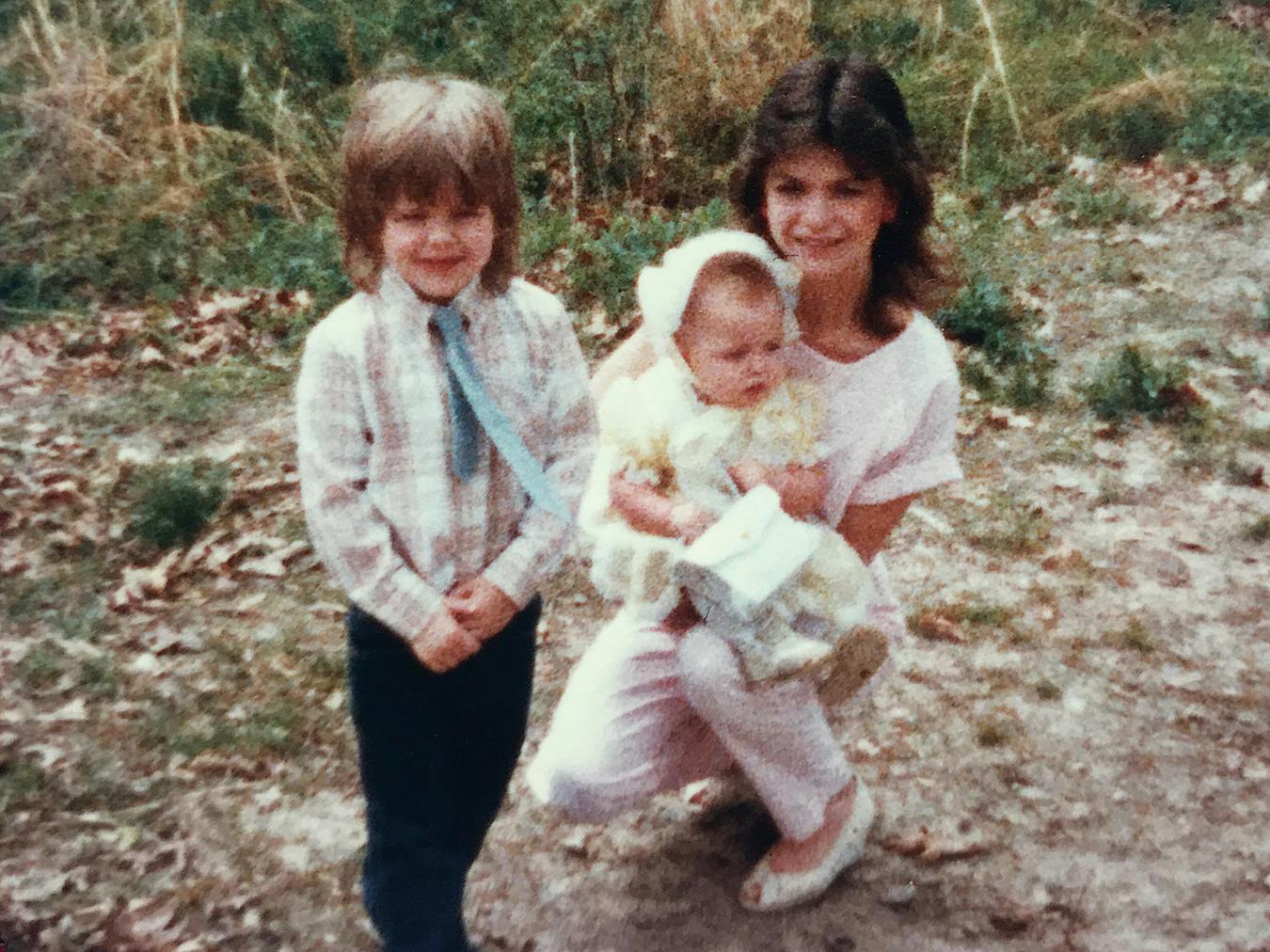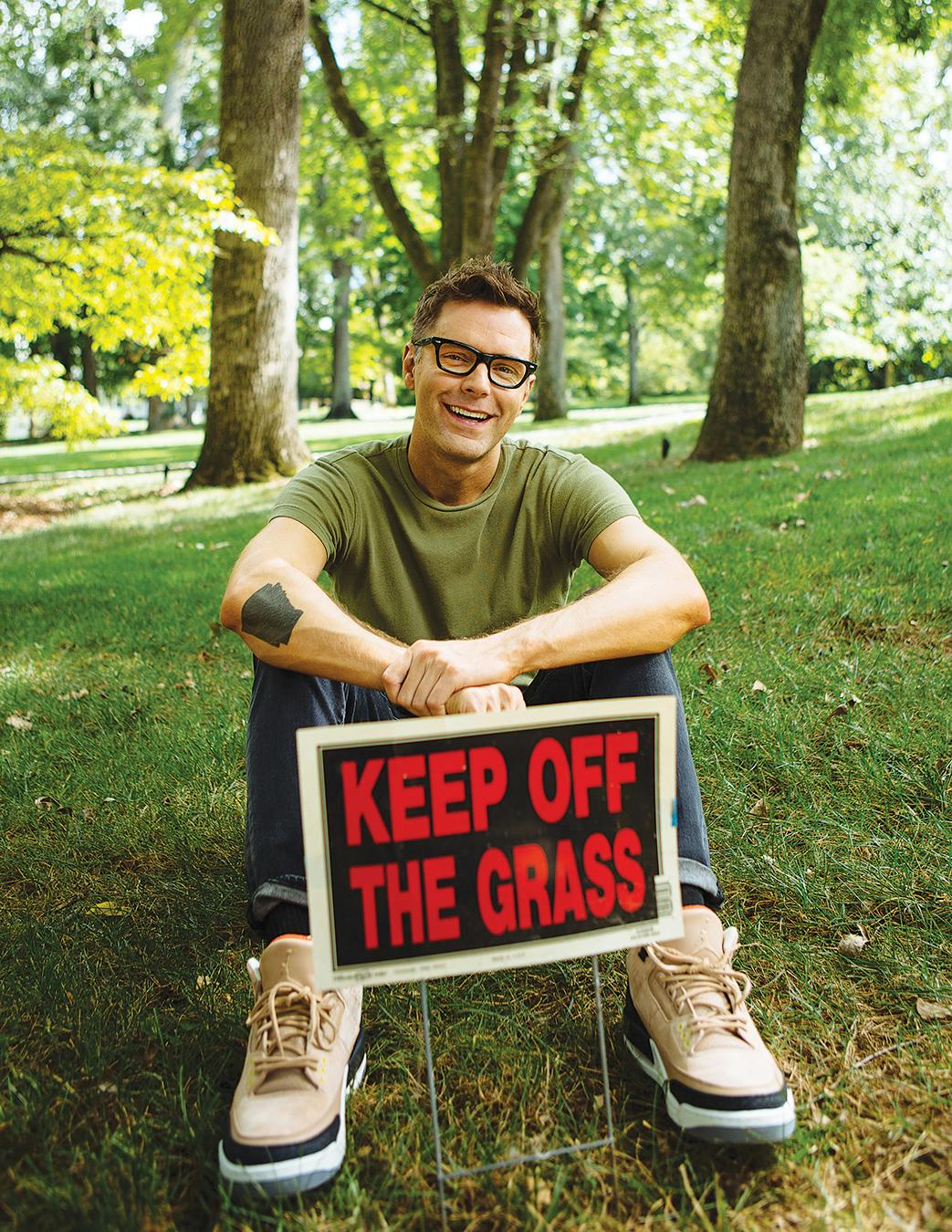Ninety seconds into his welcoming standing ovation at Austin’s Paramount Theatre, everything Bobby Bones had picked up from a childhood of watching David Letterman try to quiet his crowds—the “Shhh!” gesture, the palms-down arm wave, the polite request—had failed.
He began to mime embarrassment, ducking behind five-foot inflatable letters spelling out B-O-B-B-Y B-O-N-E-S. In the four minutes and eighteen seconds it took for the audience to settle down, Willie Nelson could have made his entrance, bathed in applause, and finished off “Whiskey River” and half of “Still Is Still Moving to Me.”
This mid-May stop of Bones’s Red Hoodie Comedy Tour, halfway through a fourteen-city national run, was a homecoming of sorts. The 38-year-old’s primary gig isn’t comedy, it’s radio. And his morning program, the freewheeling, often confessional Bobby Bones Show, was born and built in Austin over the course of a decade. It was there that he discovered his two cohosts, establishing the kind of rapport that makes his show feel like you are eavesdropping on a conversation among friends. In February 2013, tapped by executives at the radio conglomerate iHeartMedia, Bones and his crew moved to Nashville and made the switch from Top 40 music to country. Though he broadcasts out of his fully equipped studio in Austin for part of the year, the “B-Team,” as Bones’s superfans call themselves, packed the house for his return.
The evening at the Paramount, it would turn out, was less a comedy show than a promotion of all things Bones. The jokes were often little more than tee-ups for anecdotes about his recent gig as a mentor on ABC’s American Idol; teasers for his second book, a self-help guide called Fail Until You Don’t (which, like his first book, went on to become a number one New York Times best-seller); or solo acoustic renditions of songs that he usually performs at sold-out shows with his novelty band, the Raging Idiots (also two-time chart-toppers).

Post-show, the line for Bones merchandise took as long as two hours—which fans endured in order to purchase T-shirts, sweatshirts, ball caps, and baby onesies bearing optimistic messages such as “#Blessed,” “Every Day Is a Good Day,” and “#PIMPIN JOY,” a recurring theme in the Bones universe that urges listeners to have a positive attitude no matter what challenges they might face. Proceeds from the tour’s namesake red hoodies went to St. Jude Children’s Research Hospital.
All this for a radio disc jockey? Terrestrial radio audiences have been shrinking for a decade, but Bones is no ordinary DJ. Between his syndicated shows—which run on more than one hundred radio stations—and his popular music-less podcast, he reaches a reported 9.2 million people a week. Millions more follow him on social media or tune in to see him on American Idol and, more recently, Dancing With the Stars. He’s arguably the most influential voice in country music today, with the power to turn new artists into breakout stars. “With the size of his audience, if Bobby hears something, likes it, and plays it, that’s a powerful endorsement,” says Rod Phillips, executive vice president at iHeartMedia.
As music genres have blurred in recent years and country fans have grown more diverse, Bones’s willingness to break from Nashville orthodoxy has fueled his popularity. It’s not just the music he plays. He’s called out the misogyny of the bro-country movement, launched a show that exclusively features female performers, and spoken openly about issues surrounding mental health.
His lack of conformity also tracks nicely with his relentless message of personal empowerment. Bones (né Estell) bootstrapped his way to the top of country radio, essentially hacking the system wherever he could to create opportunities for himself. Raised by his mom and grandmother in a trailer in Mountain Pine, Arkansas, he and his little sister were sustained through welfare checks and food stamps. When those weren’t enough, his mother—who gave birth to him a month after turning sixteen—resorted to stealing basic necessities. She drank heavily; most nights, she’d down a twelve-pack of beer and pass out in a recliner a few feet from the couch where her son slept.

Bones’s journey from those origins is neatly summarized on one of the Red Hoodie Tour’s best-selling T-shirt messages: “Fight. Grind. Repeat.” The line serves as the subtitle of Fail Until You Don’t, and it’s printed across a chair in his Nashville studio—special-ordered for him by Garth Brooks. It’s essentially the mantra of entrepreneurs and self-made successes everywhere, an admonition to press on and keep learning as you go. And the last part—“Repeat”—is big. As Bones has expanded his brand well beyond twangy FM airwaves, he’s now mounting a challenge to conquer broader pop culture and, perhaps, beyond.
In 2011, when Bones was still based in Austin, spinning Top 40 tunes, he was in the middle of a show segment called “The Friday Morning Dance Party” when his sister called. His mom, who continued to struggle with alcohol and methamphetamine addiction long after Bones left home, had died. Bones hung up the phone just as an upbeat pop song ended and went back on the air for the remaining hour and fifteen minutes of the show, seemingly unaffected.
To those who saw it firsthand, it was an epic compartmentalization of emotions. “I remember having to physically push my chair back away from my microphone because I was crying so hard,” says his cohost Amy Brown, who has been working with Bones since 2006. “He didn’t cry. The show went on. It was very bizarre.”
It was also trademark Bones. In the same way that musicians wax about music saving their lives, Bones talks about radio. When he was five years old, just after his father left the family, his aunt bought him a small radio, asking the local DJ to wish Bones a happy birthday on air. Radio became an obsession for young Bones, a way to tune out his troubled home life.
In the spring of his senior year of high school, Bones landed a weekend job as a janitor and part-time control-board operator at Hot Springs’ KLAZ. He then quickly took over a nighttime on-air shift before graduating to Little Rock’s Top 40 outpost Q100. There, at age 21, he orchestrated the first attention-hacking stunt of his nascent career: he sent an intern to hide in the bathroom of a crosstown rival station and then commandeer the control board to connect it to Bones’s cellphone so he could promote his own show on their airwaves. After a handful of radio trade magazines covered his hijacking bit, a programmer at KISS FM in Austin, impressed by the audacity of the stunt, offered Bones a job. KISS FM became his home for the next ten years.
Bones’s career has been characterized by such oddball stunts. In 2014, a year after the Bobby Bones Show moved from Austin to Nashville, four billboards popped up around Music City. In all-caps, faux-graffiti text, they declared, “GO AWAY BOBBY BONES.” Speculation about who paid for them ran rampant on social media. Was it a rival station? A record label? An artist who felt slighted?
They were all plausible suspects. Bones was widely viewed as a replacement for a beloved DJ named Gerry House, who had hosted a morning show in Nashville since the eighties. Worse, his background in Top 40 made Music Row’s old guard suspicious.
“I never moved there saying, ‘I’m going to piss everybody off,’ ” Bones says now. “I moved there thinking, ‘I’m going to better represent the people who are listening now.’ But [the establishment] saw me as some sort of super nutty outlier.”
To be sure, iHeartRadio knew it was gambling when it repositioned Bones to country, but the company likely figured that he would help attract a younger audience. Bones recognized the potential for a more personal power move too. He was a regional talent in Austin, working in a radio format dominated by national personalities like Elvis Duran and Ryan Seacrest; switching to country, he thought, might allow him to emerge from their shadows.
The anti-Bones ads stayed up for three weeks, and shortly after they were removed, Bones added close to forty new stations to his audience. In his 2016 memoir Bare Bones: I’m Not Lonely If You’re Reading This Book, Bones revealed that he himself had paid for the $13,000 signs. Even iHeart didn’t know about the stunt until Bare Bones came out.
In the same way that musicians wax about music saving their lives, Bones talks about radio.
“The thinking was twofold,” he explains. “If I can’t get people to like me, I can get them to feel sorry for me or wonder why people hated me. Did I game the system? Sure. But I think my career has been instances of me trying to figure out ways to get around doing it the right way because I don’t think I have the tools to do it the right way. There’s a talent to that.”
He’s used that talent over and over. Perhaps most famously, in August 2015 Bones made headlines when he filed a trademark application for the phrase “Make America Great Again” and offered to sell it back to then Republican presidential candidate Donald Trump for $100,000. Two months later, Bones tweeted a picture of a check from the Trump Corporation made out to St. Jude. (The amount was whited out.) “can’t say how much the check was for. but thanks Donald Trump. This check goes to St Jude. have your slogan back,” Bones wrote.
If Bones’s stunts carry hints of Trumpian headline chasing, his radio show borrows from reality TV’s careful casting in order to maximize colorful banter. His cohosts—Brown, who defines her role as the “motherly caretaker type,” and former Jason’s Deli delivery driver and down-for-anything party animal Dan Chappell (known as Lunchbox)—had never worked in radio before Bones discovered them back in Austin. Bones himself plays the affable, neurotic guy who overshares like a nervous party guest. He’s quick to tell listeners about his depression and anxiety or that he has no life outside of the studio.
Bones spends about two hours prepping the night before each show, but he keeps his daily plan secret, even from producers and fellow on-air talent, so that each show will unfurl naturally. “Instead of the wacky morning show that sounds canned, my team is sitting over there, waiting for me to say something or ask something,” he says. “And sometimes the reaction is awesome, and sometimes it’s terrible. But they’re reacting as humans instead of as DJs.”
Most morning shows, even in small markets, have program directors closely scrutinizing the content and consultants weighing in with data on what will resonate. But Bones has been given almost complete freedom. “We trust him, and I think he trusts us to keep him between the ditches,” says Phillips, the iHeartMedia executive VP. “He likes to drive off into the ditch every now and then, which is fine. That’s part of what makes him compelling.”

Bones uses his freedom to, among other things, challenge the long-held country-radio mind-set that women prefer male performers to females. The gender imbalance in mainstream country is so stark and so ingrained that in 2015 a legendary radio consultant named Keith Hill felt comfortable enough to advise in a trade publication, “If you want to make ratings in country radio, take females out.” Bones, on the other hand, brought female artists into the studio to play on the show every day for a week in 2014. His early championing is widely credited with helping launch the careers of artists including Kelsea Ballerini and Cam and, later, boosting the ascent of Texas darling Maren Morris.
In March 2015 Bones played a song that was sent to him by his friend Chris Janson, a then unsigned artist trying to make his way in Nashville. Before cuing up “Buy Me a Boat,” Bones asked his listeners to give the “underdog” a chance. In minutes, the song shot up the iTunes charts. Bones spent the rest of that morning’s show marveling at the artist getting his break in real time, and egging on his audience to keep downloading. Eight months later, Janson had signed a deal with Warner Brothers and released his debut album.
Nearly six years after moving to Nashville, Bones has expanded from the daily Bobby Bones Show to add the weekly Country Top 30 Countdown (also syndicated nationwide). Since 2017 he’s recorded more than one hundred episodes of Bobbycast, an interview-format podcast, and he produces six more podcasts on the Nashville Podcast Network. In 2017 he became the youngest inductee ever to the National Radio Hall of Fame.
On November 19, Bones appeared on the final episode of Dancing With the Stars wearing a white tuxedo and tails and a top hat, along with his signature nerdy black-framed glasses. He’d steadily advanced through the season, despite uneven performances that led to lower scores from the judges, because his fans kept voting for him. After the final dance, he and his partner, a professional named Sharna Burgess, collapsed onto the stage when they got three Perfect 10 scores from the judges. The Washington Post called it “shocking” and posited that this could have been “the biggest upset in Dancing With the Stars history.”

All of which makes the title of Fail Until You Don’t somewhat ironic. Where are his failures? For one, he says, he’s long failed to break into television. Appearing on reality shows is one thing, but he wants to be a force on TV the way he is on the radio. “I’ve been trying fifteen years to get on television in a meaningful way. I beat down doors. I wrote scripts. I made pilots. And it was rejection after rejection,” he says.
Just before the publication of the book this past summer, Bones heard the news that, finally, two of his television projects had gotten the green light. Nondisclosure agreements prevent him from saying more just yet, but he promises, “They’re real and they’re happening, unless I tweet out something terrible on Ambien.”
The timing was good: he signed a contract in July and was promoted to vice president and creative director of iHeartCountry. But when I visited him in the studio in June, he made a point of questioning, on air, just how long he’d stick with radio. He wasn’t so much conducting contract negotiations in public, he told me, as he was bringing his listeners in on the internal dialogue. (That said, how better to gain leverage than by raising the possibility of leaving?)
He does worry that he’s stretching himself too thin. “I don’t know how healthy I can be, keeping this pace,” says Bones, who, during the taping of American Idol, woke up at 1 a.m. to host his show from iHeart’s Los Angeles studios. “But I don’t think I ever won’t do radio. I feel like, between the radio, the podcast, the books, even social media, you have to be a personality eleven places now, or you’re not a personality anywhere.”

And he’s already thinking beyond television to what’s next. When I ask if he thinks about using his middle-of-the-country voice to take on more hot-button issues in a divided America, he has a surprisingly candid answer. “I’m going to run for office. I will be the governor of Arkansas, and I may be the president one day.” He says he leans neither blue nor red—it depends on the issue—and confirms that he looked at the possibility of running in Arkansas this past election cycle. “After talking to people and seeing how much money it was going to take, I just couldn’t see doing it right now.”
Maybe that’s just another ploy to drum up headlines. But Bones knows that he’s built a platform that could turn into a populist movement and that, as an embodiment of the American dream for millions, he could lead such a movement. “I think that I represent people that sometimes don’t have a voice because of how they grew up or where they grew up or the options that were given to them,” he says. “I was able to kick my way out of that, but we have a real class problem in this country, where it’s hard to jump classes.” The idea of President Bones might sound absurd, but then again, Texas lieutenant governor Dan Patrick was a talk radio host. President Trump was a reality TV star. And Bones has a way of getting where he wants to go. It’s called Fail Until You Don’t.
This article originally appeared in the January 2019 issue of Texas Monthly. Subscribe today.
- More About:
- Music
- Longreads
- Country Music
- Austin







